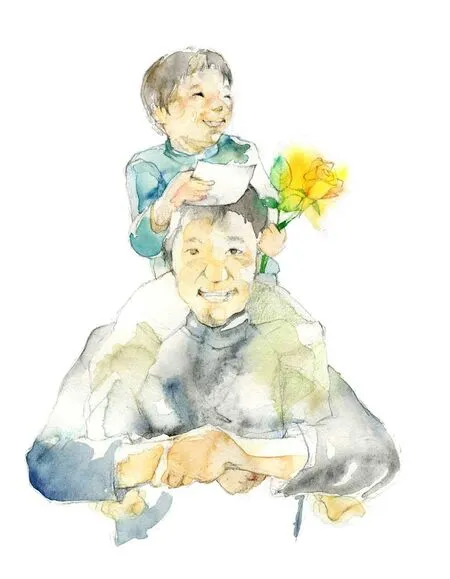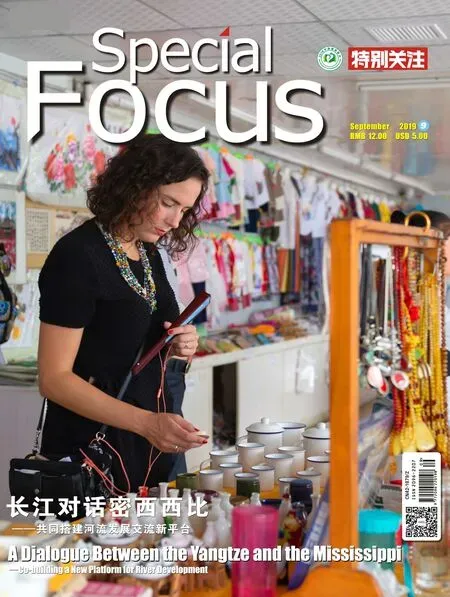Waiting for Your Embrace
2019-10-10ByWuNienJen
By Wu Nien-Jen
I left home at the age of 16. While I was still living in my family's home, we slept seven to a bed. It was a small, humble thing with just a wooden frame, a straw woven mat, and a comforter to keep us warm during the chill of those icy winter nights.
By all rights, a family like this should, be as close as peas in a pod, wouldn't you agree? But this pod had no room for the likes of my father.
My father had been trying to figure out how to get close to us kids throughout our childhood, but always missed the mark.
My siblings and I could never find that mark either.
Growing up, I looked forward with bated breath to the time when my dad had to work the swing shift, because he wouldn't be there when I got home from school. And his absence would relieve the house of a sinister apparition-like tension that pervaded the atmosphere. My mother would say, “When the cat's away, the mouse will play.”
As we kids slumbered soundly strewn about in a jumbled heap all over the bed, my weary father would come back shortly after the stroke of midnight and have to move us one by one to make a small space to lie down.
I was often woken up by the rusty creek of the door opening, but continued trying to sleep, waiting pensively for my father to finish his shower and go to bed.
He would stand up for a while and sometimes even mumbled to himself curmudgeonly, “Oh, for God's sake, just look at these rug rats...” Then the bed would gently rock back and forth, and the acrid odor of lemon soap would linger lazily through the drafty room. I would feel his big hands, strong and sure, pass over my shoulders and thighs, and finally pick me up and put back into place. Finally, a quilt would be pulled up snug under my chin.
I liked it when my father worked the night shift. It seemingly gifted us with a special moment. The chance at a warm embrace from my father that would last for almost a minute.
One day after I was all grown up, I came clean with my younger brothers and sisters about how I felt as I pretended to sleep when Dad came home from work. It really blew my mind when they replied, “Same here, same here.”
With such a shortage of opportunities to be close, some memories of paternal closeness really stick out.
The time when my father's leg was crushed by a fall into a pit in the mines where he worked is still vivid in my mind. The injury was so serious that he had to be transferred from the miners' hospital to a private surgical hospital in Taipei.
As his hospital stay dragged on and on, my mother was forced to go out into the world and find work to raise the family. Meanwhile, his condition in the hospital was almost unknown to anyone. One Saturday afternoon after school, on a whim I just jumped on a train bound for Taipei. After getting off the bus, I asked directions to the surgical hospital from every willing passerby like a super sleuth until I managed to track it down. I made my way to the ward where he was staying and finally to his room filled with six beds occupied by patients chatting pleasantly with their relatives. The moment when I saw a father lying there in a frump with both his faculties and dignity severely compromised is burned into my brain for all time.

我16岁离家之前,我们一家七口全睡在一张床上,是那种用木板架高、铺着草席、冬天加上一层垫褥的通铺。
这样的一家人应该很亲近吧?没错,不过,不包括父亲在内。
父亲可能一直在摸索、尝试与孩子们亲近的方式,但老是摸不着门道。
同样地,孩子们也是。
小时候特别喜欢父亲上小夜班的那几天,因为放学回来时他不在家。他不在,整个家就少了莫名的肃杀和压力,妈妈形容是“猫不在,老鼠呛须”。
午夜父亲回来,他必须把睡得横七竖八的孩子一个一个搬动、摆正之后,才有自己躺下的空间。
那时候,我常被他开门闩门的声音吵醒,但我会继续装睡,等着洗完澡的父亲上床。
他会稍微站定观察一阵,有时候甚至会喃喃自语地说:“实在啊……睡成这样。”然后床板轻轻震动,接着闻到他身上柠檬香皂的气味慢慢靠近,感觉他的大手穿过我的肩胛和大腿,最后整个人被他抱起来放回原位,然后拉过被子帮我盖好。
喜欢父亲上小夜班,其实喜欢的仿佛是这个特别的时刻,短短半分钟不到的来自父亲的拥抱。
He was fast asleep, and the jagged shafts of the afternoon sunlight cut across his gaunt features.
His stringy hair was uncombed, it lay there in clumps strewn about his head, wiry and gray. He had grown a shaggy beard as his face appeared to not have been shaved for a few days. The plaster encasing his right leg was peeking out from the quilt covering him, exposing long, dirty toenails.
For the life of me I'll never know why, but the very first thing that came to mind was to help him cut those filthy toenails. The nurse said that there were no nail clippers available, but that I could borrow a small pair of scissors. Fighting back the tears, I lowered my head and began carefully clipping his toenails right in front of all present in the tiny, dank hospital room.
As I did the work I happened to glance up and it suddenly hit me that my father's eyes were open and he had been staring at me for God only knows how long.
“Mom told you to come over?” he asked in a croaky frog voice.
“No.”
“You came by yourself? Didn't you tell your mother?”“No.”
“Bakayaro.” He muttered in Japanese, which is an insult in the language that basically translates to “stupid lowly one of meager education.”
Gradually the scintillating glow of day turned to the Cimmerian darkness of night; by and by the incandescent fires of the neon lights burned a psychedelic rainbow around the little room. “It's getting dark. I will take you to the movies. You can sleep here tonight.” Father offered.
That night, propping himself up for support on one shoulder and holding a cane in one hand, father carefully negotiated the weekend crowds, walking through the long winding streets to the cinema.
It was the first time in my life that I had ever been to Taipei alone. I slept alone with my father for the very first time. I helped my father cut his toenails for the very first time, but it was the last time I would ever watch a movie with my father.
In a sprawling cinema called the Far East Theater, we took in a Japanese documentary directed by Kon Ichikawa, called “Tokyo Olympiad.”
The film seemed so very long that night. It's been 20 years since my father's passing, but that long film still often plays in the theater of my mind. (FromThese People, Those Affairs, Yilin Press. Translation: Chase Coulson)

长大后的某一天,我跟弟妹坦承这种装睡的经验,没想到他们都说:“我也是,我也是。”
或许亲近的机会不多,所以,某些记忆特别深刻。
有一年,父亲的腿被矿坑的落磐压伤,伤势严重到必须从矿工医院转到台北一家私人的外科医院治疗。
由于住院的时间很长,妈妈得打工养家,所以,他在医院的情形几乎没人知道。一个星期六的中午,放学之后,我一时冲动,竟然跳上开往台北的火车。下车后,不断地问路才找到那家外科医院,然后,在挤满六张病床和陪伴家属的病房里,看到一个毫无威严、落魄不堪的父亲。
他是睡着的。4点多的阳光斜斜地落在他消瘦了的脸上。
他的头发没有梳理,既长且乱,胡子也好像几天没刮;打着石膏的右腿露在棉被外,脚指甲又长又脏。
不知道为什么,我想到的第一件事,竟然就是帮他剪脚指甲。护士说没有指甲剪,不过,可以借我一把小剪刀。然后,我就在众人的注视下,低着头忍住一直要冒出来的眼泪,小心翼翼地帮父亲剪脚指甲。
当我剪完所有的脚指甲,抬起头,才发现父亲不知道什么时候已经睁着眼睛看着我。
“妈妈叫你来的?”
“不是。”
“你自己跑来的?没跟妈妈说?”
“没有。”
“马鹿野郎。”(日本的国骂“八嘎牙路”汉字写法,意指对方蠢笨、没有教养)
直到天慢慢转暗,外头霓虹灯逐渐亮起来之后,父亲才开口说:“天暗了,我带你去看电影,晚上就睡这边吧。”
那天夜晚,父亲一手撑着我的肩膀,一手拄着拐杖,小心地穿越周末熙攘的人群,走过长长的街道,去看了一场电影。
那是我人生第一次一个人到台北、第一次单独和父亲睡在一起、第一次帮父亲剪脚指甲,却也是最后一次和父亲一起看电影。
那是一家很大的电影院,叫远东戏院。那天上映的是一部日本纪录片,导演是市川昆,片名叫《东京世运会》。
片子很长,长到父亲过世20年后的现在,还不时在我脑袋里播放着。(摘自《这些人,那些事》 译林出版社)
